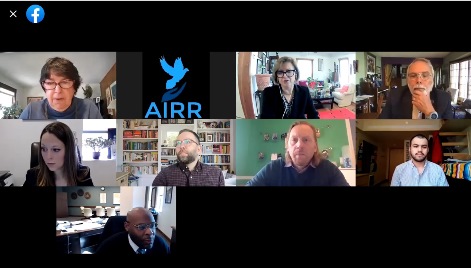Kansas governor also vetoes bill forbidding city, county bans on single-use plastic
by Tim Carpenter, Kansas Reflector
Topeka — Gov. Laura Kelly threw up a roadblock to Amazon’s request for legal authority to operate fully electric, autonomous delivery devices in Kansas.
The authorization bill vetoed by the governor was approved 22-17 in the Senate and 75-47 in the House, but neither margin would suggest there was support to override the governor’s veto. The Legislature could return to Senate Bill 161 when it reconvenes April 25 to close out the 2022 legislative session.
She also rejected Senate Bill 493, which Republican legislators sought to thwart action by cities or counties to ban stores from using plastic packaging that often wound up littering the ground. This bill didn’t receive two-thirds majorities in the House and Senate to indicate a veto override was certain.
Gov. Kelly, a Democrat seeking re-election in November, said she wasn’t satisfied with safety precautions in the bill guiding operation of large robotic devices on residential sidewalks.
“This bill does not clarify who is responsible for enforcing rules and regulations related to personal delivery devices other than requiring an annual fee and a certification form with minimal information,” Gov. Kelly said. “The provisions around minimum liability are also ambiguous and unclear in their application.
She said veto of the bill Monday was necessary to give the Legislature more time to work on a bipartisan solution that embraced technological advances and addressed public safety.
Ashleigh de la Torre, who leads transportation and sustainability public policy at Amazon, told legislators in March she was interesting in convincing state lawmakers to allow personal delivery devices, including the Amazon Scout, to be operated on sidewalks of Kansas. The program’s objective is to allow Amazon to work toward reductions in greenhouse gas emissions, she aid.
Amazon launched its autonomous delivery program in January 2019 with a device the size of a picnic cooler, she said. It operated at a speed that paces the average person walking on a sidewalk in four communities — Snohomish County, Washington; Irvine, California; Franklin, Tennessee; and Atlanta, Georgia.
“Scout has been designed for safety and accessibility,” she said. “Scout is able to stop, or safely navigate around pedestrians, pets and obstacles. Scout will provide visual and audio cues to alert people sharing the sidewalk of its presence. Scout will also instantly stop if something crosses in front of it.”
Under the bill vetoed by the governor, the state would allow personal delivery devices to operate primarily on sidewalks, crosswalks roadway shoulder or right side of a public highway of any municipality. The devices wouldn’t exceed 550 pounds, excluding cargo and would navigate with or without the active control or monitoring of a person.
The devices wouldn’t be considered a vehicle under state law and would have to yield to all vehicles, not block public rights-of-way, obey all traffic signals, operate at a maximum of 10 miles per hour on sidewalks and prominently display an identifying number.
In addition, the bill authorized local units of government to ban personal delivery devices by resolution or ordinance in the interest of public safety. The bill prohibited city or county government from regulating the design, manufacture or maintenance of a personal delivery device or the types of property the device may transport.
Meanwhile, Kelly also vetoed Senate Bill 493 that would have prohibited municipalities from adopting or enforcing an ordinance, resolution, or regulation that would restrict, tax, prohibit or regulate use of plastic straws, bags, cups, packages, containers, bottles, device or other packaging.
“The disposal and regulation of solid waste is traditionally a public policy issue that Kansans decide at the local level with input from local businesses, waste management providers and private citizens,” the governor said. “As this bill advanced through the process, no evidence was provided demonstrating why the Legislature had a compelling public interest to repeal city and county local control and home rule over these matters.”
There has been discussion in Wichita and other communities about banning reliance on single-use plastic bags for consumer purchases of light-weight goods and carry-out food from restaurants.
Kansas Reflector stories, www.kansasreflector.com, may be republished online or in print under Creative Commons license CC BY-NC-ND 4.0.

